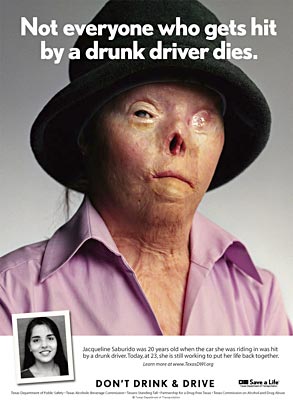|
Janelle Kanovich, 22, of
Harrisburg, Pennsylvania, drinks free tequila at a nightclub during her
first night of spring break in Cancun, Mexico. A new report shows that
drinking among college students needs to seen as a major health concern,
experts say.
 April
9 —
The consequences of college drinking are more destructive than
commonly thought, suggests a new study that finds an estimated 1,400
students aged 18 to 24 are killed every year in alcohol-related
accidents. April
9 —
The consequences of college drinking are more destructive than
commonly thought, suggests a new study that finds an estimated 1,400
students aged 18 to 24 are killed every year in alcohol-related
accidents.
“HALF THE World Trade
Center casualties are happening every year in our colleges,” said one
researcher, Mark Goldman, a psychology professor at the University of
South Florida.
The study, which the
researchers call the most comprehensive look ever at the consequences of
college drinking, also estimated it contributes to 500,000 injuries and
70,000 cases of sexual assault or date rape. And 400,000 students
between 18 and 24 years old reported having had unprotected sex as a
result of drinking.
Additionally, more than
one-fourth of college students in that age group have driven while under
the influence in the past year, the report said.
The researchers say the
figures show that college drinking needs to seen as a major health
concern.
“Historically, I think
there has been the view that whatever college students are doing, it’s
not that serious a problem, it’s a rite of passage,” said another
researcher, Kenneth J. Sher, a psychology professor at the University of
Missouri-Columbia.
The report was one of 24
studies commissioned by federally supported Task Force on College
Drinking, a panel of college presidents, scientists and students
convened by the National Institute on Alcohol Abuse and Alcoholism. The
institute is part of the National Institutes of Health.
Most of the papers will be
published in the forthcoming March issue of the Journal of Studies on
Alcohol.
Study sheds light on dangerous
drinking
April 9, 2002 — A major
new study reveals disturbing details about the dangerous drinking habits
on college campuses across America. NBC’s Robert Hager reports.
Researchers integrated
various databases and survey results to reach their findings.
Motor vehicle fatalities
were the most common form of alcohol-related deaths. The statistics
included college students killed in car accidents if the students had
alcohol in their blood, even if the level was below the legal limit.
Students who died in other
alcohol-related accidents, such as falls and drownings, were included.
Those who died as a result of homicides or suicides were not.
Chief researcher Ralph
Hingson of the Boston University School of Public Health said he
believes the estimates are more likely to be too conservative than
overstated.
“I think actually getting
the numbers out will help the public understand that this is a very
large problem, perhaps a larger problem than people might have otherwise
thought,” he said.
MANY JUST SAY NO
Though common on many campuses, alcohol abuse does not run rampant among
all university students, the panel said. Previous studies have shown
that most students drink moderately or abstain, with the proportion of
teetotalers increasing from 15 percent to 19 percent from 1993 to 1999.
In general, drinking rates
are highest among incoming freshmen, males, members of fraternities or
sororities and athletes, the task force said. Students who attend
two-year institutions, religious schools, commuter schools or
predominantly or historically black colleges drink the least.
The big problem: Binge
drinking, defined as five or more drinks in a row for men and at least
four for women.
About 40 percent of
students binge drink, according to background data in the report, about
the same percentage as in the early 1990s.
And in a recent survey,
about 20 percent of students reported bingeing more than three times in
the last two weeks. That group accounts for nearly 70 percent of all the
alcohol consumed by college students, the panel said.
“Although a minority of
college students engage in high-risk drinking, [all] suffer its negative
consequences,” said Reverend Edward Malloy, president of the University
of Notre Dame and co-chair of the Task Force.
Hingson and other
panelists say studies have shown what works - and what doesn’t - in
deterring alcohol use.
What Colleges Can Do!
Among the steps that universities can take to create a healthy
environment on campus:
- Enforce existing age 21 laws on
campus.
- Help students understand that they
have the right not to drink and to have negative feelings about its
consequences.
- Communicate alcohol policies to
students and parents.
- Limit the availability of alcohol
on campus.
- Use brief motivational
interventions, such as giving feedback on students' personal
drinking behavior and negative consequences.
- Increase screening and outreach
programs to identify students who could benefit from alcohol-related
services.
- Avoid educational efforts focused
primarily on facts about alcohol and associated harm. They have
proven to be ineffective.
- Use educational interventions that
provide new information such as informing students about
drinking-and-driving laws and explaining how to care for peers who
show signs of alcohol poisoning.
Goldman said general
messages warning of the dangers of alcohol do not appear to be effective
with college students, at least by themselves. What’s more effective is
teaching students how to resist peer pressure.
“Many of the students
don’t want to do it, but they don’t know how to say no,” he said.
Communities and colleges
need to work together as well to prevent underage drinking and limit the
number of stores that sell alcohol, he said.
“The university can’t do
them by themselves because even if they did effective things, it might
just squeeze it off into the community,” Goldman said.
The Associated Press
contributed to this report.
Alarming rise in
alcohol abuse during COVID pandemic, study finds
By Hannah Sparks | New York Post
February 18, 2021
"Hazardous" drinking rose from 21% in April to 40.7%
in September last year.
Americans, particularly young adults, are increasingly turning to
alcohol to cope with life during a viral pandemic, a new study shows.
Researchers at the University of Arizona are sounding the alarm on a
spike in substance abuse as Americans have endured a year of devastating
illness, isolation and job loss caused by the global coronavirus
outbreak. Their new study revealed trends during lockdown pointing to
“hazardous or harmful alcohol consumption,” as well as an increased
likelihood of developing alcohol dependence or a “severe” substance
abuse disorder.
The results are published in the latest volume of Psychiatry Research.
“Being under lockdown during a worldwide pandemic has been hard on
everyone, and many people are relying on greater quantities of alcohol
to ease their distress,” said lead author Dr. Scott Killgore in a
university press statement. Killgore’s team surveyed roughly 1,000 per
month — a total of 5,931 adults — from all 50 states and DC between
April and September 2020.
“We found that younger people were the most susceptible to increased
alcohol use during the pandemic, which could set them on the dangerous
path toward long-term alcohol dependence,” Killgore said.
Each month, participants were asked to answer a 10-question survey to
investigate their drinking habits, whether their behavior is consistent
with “dependence” or if they’ve ever harmed or been harmed as a result
of alcohol use. Scores assessed by the test model, called the AUDIT
(Alcohol Use Disorders Identification Test) — something you can try at
home — range from 0 to 40, with the highest points (20 and up)
indicating “severe” alcohol abuse.
At the end of the study, researchers had found that an increase in
“hazardous” alcohol use, from 21% among April’s cohort to 40.7% in
September. Apparent alcohol dependence rose from 7.9% to 29.1%; those
who scored 20 and up on the test jumped from 3.9% to 17.4% by fall.
SEE ALSO
The Mayo Clinic's findings also indicate that drinking too much alcohol
can have a negative impact on the body’s immune system
Excessive drinking during coronavirus lockdowns could weaken immune
system
Researchers also included responses from volunteers who had not been
living under lockdown restrictions, and found their drinking habits had
remained steady during the study period.
The high health risks caused by alcohol abuse goes without saying, but
Killgore worries especially about spouses and children, he said.
“Being cooped up with family for weeks and months without a break can be
difficult, but when excess alcohol gets mixed in, it can become a recipe
for increased aggressive behavior and domestic violence.”
Signs of addiction and problem drinking have never been easier to hide,
as the work-from-home lifestyle can make it difficult for colleagues and
friends to spot a co-worker in trouble.
Killgore’s bigger-picture conclusion is that functional daily drinking
may also be delaying the recovery of our decimated economy.
“Having a few drinks while ‘on the clock’ at home can lead to a
situation of ‘presenteeism,’ which means that a person may be sitting
through Zoom meetings and responding to a few emails, but may not
actually be contributing productively to their job,” said Killgore.
“This could severely hamper our ability to pull out of this crisis
quickly and on a strong economic footing.”
SOURCE
The Truth About Booze - part 1 (Pastor Jeff Owens)
The Truth About Booze - part 2 (Pastor Jeff Owens
The Salvation of a Nation (by Pastor Jack Hyles)
Hear Billy Sunday's "Booze Kills!" (MP3)
Hear Billy Sunday on Prohibition (MP3)
|
 April
9 —
April
9 —